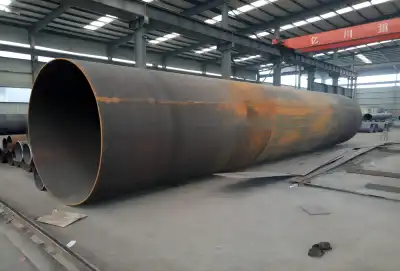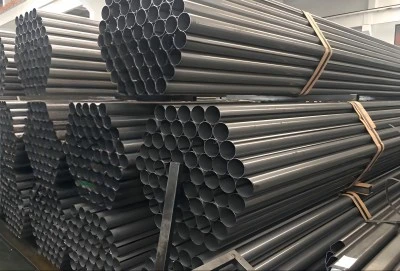Steel pipes play a crucial role in various industries, from oil and gas transportation to construction and infrastructure development. Among the many types available, LSAW (Longitudinal Submerged Arc Welded) and ERW (Electric Resistance Welded) steel pipes are two prominent varieties that serve different applications based on their unique manufacturing processes and characteristics. Understanding the key differences between these pipe types is essential for making informed decisions in engineering and construction projects.
|
|
|
Different Welding Processes
LSAW steel pipes employ double-sided submerged arc welding technology, representing a sophisticated manufacturing process that produces high-quality welds. The process involves welding both the inside and outside of the pipe simultaneously or in sequence, utilizing a granular flux material that shields the welding area from atmospheric contamination. This comprehensive welding approach ensures superior joint strength and integrity throughout the pipe's length.
The submerged arc welding process used in LSAW pipe production creates a deep penetration weld that exhibits excellent toughness, plasticity, and uniformity. The flux covering during welding prevents oxidation and provides additional alloying elements to enhance weld properties. The resulting weld zone demonstrates consistent mechanical properties and minimal residual stress, contributing to the pipe's overall reliability in demanding applications.
In contrast, ERW steel pipes utilize high-frequency resistance welding technology, where electrical current generates heat at the joining edges of the steel strip. This process relies on the principle of electrical resistance to create localized heating, followed by immediate pressure application to form a solid-state bond. The welding occurs without additional filler material, as the parent metal itself fuses to create the joint.
Product Specification Range
LSAW steel pipes demonstrate remarkable versatility in producing large-diameter, thick-walled pipes suitable for high-pressure applications. These pipes typically range from 16 inches to 120 inches in diameter, with wall thicknesses capable of exceeding 40mm. This substantial size range makes them ideal for major pipeline projects requiring robust mechanical properties and excellent pressure resistance.
The capability to manufacture thick-walled pipes enables LSAW products to withstand extreme environmental conditions, including high pressure, low temperature, and corrosive environments. These characteristics make them particularly valuable in offshore oil and gas pipelines, where operating conditions can be severe and reliability is paramount.
ERW steel pipes generally focus on smaller and medium diameter ranges, typically from 0.5 inches to 24 inches, with wall thicknesses usually not exceeding 12.7mm. This limitation stems from the inherent constraints of the high-frequency welding process and the continuous forming method employed in their production.
Forming Method
LSAW (Longitudinal Submerged Arc Welded) pipe manufacturing is a highly advanced process that utilizes sophisticated forming methods, including UOE, JCOE, and HME techniques, each designed to ensure precision, strength, and reliability in the final product. These methods are specifically chosen based on the application requirements, pipe dimensions, and operational needs, offering manufacturers flexibility in producing large-diameter and thick-walled pipes for critical infrastructure projects.
In contrast to LSAW manufacturing, ERW (Electric Resistance Welded) pipe formation utilizes a continuous production process that is particularly efficient for smaller-diameter pipes. During this process, flat steel strips are fed through a series of forming rolls, gradually shaping the material into a circular cross-section. The edges are then welded together using high-frequency electrical currents, creating a strong and seamless bond. While ERW pipes are highly efficient to produce and suitable for lower-pressure applications, their size and wall thickness are limited compared to LSAW pipes. As a result, ERW pipes are often used for smaller-diameter pipelines, such as water distribution or low-pressure oil and gas transportation systems.
Weld Quality
LSAW (Longitudinal Submerged Arc Welded) steel pipes are widely regarded for their exceptional weld quality, which is achieved through a meticulous and advanced welding process. The double-sided submerged arc welding (DSAW) technique employed in the production of LSAW pipes ensures full penetration and fusion across the entire wall thickness. This robust welding process significantly enhances the structural integrity of the pipes, making them suitable for demanding applications such as oil and gas transportation, water pipelines, and structural engineering projects.
One of the key advantages of the LSAW welding process is its ability to produce uniform, high-strength welds. The double-sided welding ensures that both the interior and exterior weld seams are fused completely, eliminating the risk of incomplete penetration or porosity. This level of precision not only improves the mechanical strength of the weld but also ensures consistent performance under high-pressure and high-temperature conditions. As a result, LSAW pipes exhibit superior durability and reliability compared to other types of welded pipes.
China Wholesale API 5L LSAW Steel Pipe Manufacturers
LONGMA GROUP has solidified its reputation as a leading manufacturer of LSAW (Longitudinal Submerged Arc Welded) steel pipes, catering to the needs of industries worldwide. The company’s products are meticulously designed and manufactured to meet a wide array of international standards, including API 5L, ASTM A53, ASTM A500, ASTM A252, and ASTM A795, ensuring compliance with the most stringent quality and performance requirements. These standards certify that LONGMA GROUP's pipes are suitable for critical applications, including oil and gas transportation, water supply systems, construction, and structural engineering.
The company's commitment to quality control and adherence to international standards ensures that its LSAW steel pipes meet rigorous performance requirements. Their production facilities utilize advanced technology and quality control systems to maintain consistent product quality throughout the manufacturing process.
LONGMA GROUP ensures that every pipe undergoes stringent quality control measures, including non-destructive testing, mechanical property evaluation, and hydrostatic pressure testing, to guarantee reliability and safety. Their dedication to innovation and continuous improvement has allowed them to remain at the forefront of the steel pipe industry. With a commitment to customer satisfaction, LONGMA GROUP also offers customized solutions, tailoring products to specific project requirements and industry standards.
Customers interested in sourcing wholesale API 5L LSAW steel pipes can contact LONGMA GROUP directly through info@longma-group.com. Their technical team provides comprehensive support in product selection and specification compliance, ensuring customers receive products that meet their specific project requirements.














